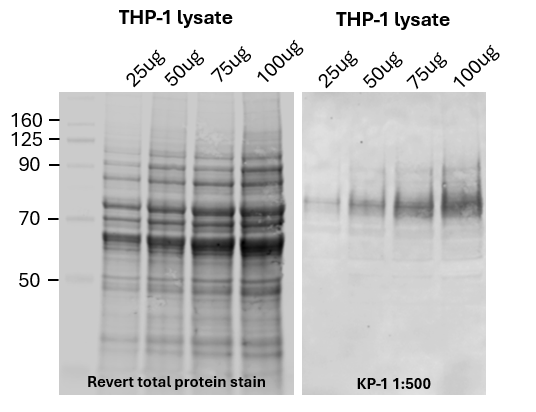Anti-Human CD68 (Clone KP1) – Purified No Carrier Protein
Anti-Human CD68 (Clone KP1) – Purified No Carrier Protein
Product No.: C920
- -
- -
Clone KP1 Formats AvailableView All Product Type Monoclonal Antibody Isotype Mouse IgG1 κ Applications B , EM , FC , ICC , ICFC , IHC , IHC FFPE , IP , WB |
Data
 Western blot (right)
Western blot (right)Varying quantities of cell lysates were run on a 4-12% XT-Bis Tris gel in MES buffer.
Blot was incubated with primary antibody clone KP-1 (1:500) in PBS-T and goat anti-mouse IR-800 (LI-COR, 1:20,000) was used for detection on a LI-COR Odyssey.
*Data generously provided by Ryan Chen and Valentina Rangel-Angarita of the Dr. Stacy Malaker Lab at Yale University
- -
- -
Antibody DetailsProduct DetailsReactive Species Human Host Species Mouse Product Concentration ≥1.0 mg/ml Purity ≥90% monomer by analytical SEC and SDS-Page Formulation This monoclonal antibody is aseptically packaged and formulated in 0.01 M phosphate buffered saline (150 mM NaCl) PBS pH 7.2 - 7.4 with no carrier protein, potassium, calcium or preservatives added. Due to inherent biochemical properties of antibodies, certain products may be prone to precipitation over time. Precipitation may be removed by aseptic centrifugation and/or filtration. Product Preparation Purified antibodies are manufactured in an animal free facility using only in vitro protein free cell culture techniques and are purified by a multi-step process including the use of protein A or G to assure extremely low levels of endotoxins, leachable protein A or aggregates. Storage and Handling Functional grade preclinical antibodies may be stored sterile as received at 2-8°C for up to one month. For longer term storage, aseptically aliquot in working volumes without diluting and store at -70°C. Avoid Repeated Freeze Thaw Cycles. Country of Origin USA Applications and Recommended Usage? Quality Tested by Leinco FC5, 10, 12, WB4, 7, 10, Additional Applications Reported In Literature ? IHC5, 7, 8, 9, 10, 11, IHC FFPE10, IP1, 4, 10, 12, ICFC5, 7, ICC4, 12, Dot12, B12, EM2, Each investigator should determine their own optimal working dilution for specific applications. See directions on lot specific datasheets, as information may periodically change. DescriptionDescriptionSpecificity Anti-CD68 antibody (clone KP1) activity is directed against human CD68. Background CD68 is a heavily glycosylated type I transmembrane glycoprotein belonging to the lysosomal-associated membrane protein (LAMP) family and may play a role in endocytosis or lysosomal traffic and phagocytic activities1. CD68 localizes to endosome- or lysosome-like structures2. Additionally, LAMPS have been implicated in tumor cell metastasis and are over-expressed on the surface of metastatic compared with nonmetastatic cell lines3.
KP1 was originally used as a pan-monocytic/macrophage marker against CD68; however, CD68 is not a macrophage specific antigen and KP1 is known to stain neutrophils and other non-macrophage-like cells4,5,6,7,8. KP1 reacts against CD68 in a wide range of healthy4 and disease-associated (rheumatoid arthritis and osteoarthritis)5 tissues as well as a variety of neoplasms9, tumor cell lines7, and tumor-associated macrophages 8. KP1 detects a fixation-resistant epitope10 that is likely glycan-based1,9 which is shared by many cell types7. KP1 was developed by immunizing Balb/c mice against a lysosomal fraction of human lung 10. Hybridoma supernatants derived from spleen cells were screened on cryostat human lung and tonsil sections as well as paraffin wax sections of lung tissue fixed in formol saline. Antigen Distribution CD68 is found in the cytoplasm of monocytes/macrophages, fibroblasts, human peripheral blood lymphocytes, neutrophil primary and mast cell granules, large granular lymphocytes, basophils, basal epithelial cell layers, renal glomeruli, myeloid cells, endothelial cells, retinal epithelial cells, osteoblasts, fibroblast-like cells from bone marrow, and a wide-range of lymphoid neoplasms. CD68 is predominantly located in lysosomal membranes, with a small amount on the cell surface. Additionally, CD68 can be expressed in most hematopoietic cell lines by phorbol-induced differentiation; soluble CD68 can also be found in serum and urine. NCBI Gene Bank ID Research Area Immunology References & Citations1. Holness CL, Simmons DL. Blood. 81(6):1607-1613. 1993.
2. Saito N, Pulford KA, Breton-Gorius J, et al. Am J Pathol. 139(5):1053-1059. 1991. 3. Saitoh O, Wang WC, Lotan R, et al. J Biol Chem. 267(8):5700-5711. 1992. 4. Pulford KA, Sipos A, Cordell JL, et al. Int Immunol. 2(10):973-980. 1990. 5. Kunisch E, Fuhrmann R, Roth A, et al. Ann Rheum Dis. 63(7):774-784. 2004. 6. Beranek JT. Ann Rheum Dis. 64(2):342-343; author reply 343-344. 2005. 7. Gottfried E, Kunz-Schughart LA, Weber A, et al. Scand J Immunol. 67(5):453-463. 2008. 8. Frafjord A, Skarshaug R, Hammarström C, et al. Scand J Immunol. 92(1):e12889. 2020. 9. Warnke RA, Pulford KA, Pallesen G, et al. Am J Pathol. 135(6):1089-1095. 1989. 10. Pulford KA, Rigney EM, Micklem KJ, et al. J Clin Pathol. 42(4):414-421. 1989. 11. Smith ME, Costa MJ, Weiss SW. Am J Surg Pathol. 15(8):757-763. 1991. 12. Micklem K, Rigney E, Cordell J, et al. Br J Haematol. 73(1):6-11. 1989. Technical ProtocolsCertificate of Analysis |


